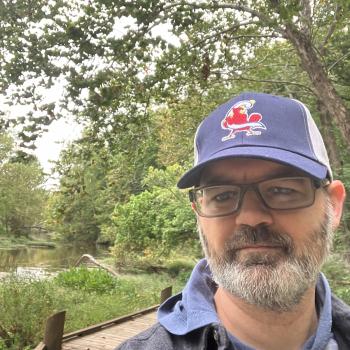Harry Potter and the Deathly Hallows: Part 2, the eighth and final film in the Harry Potter series, opens today in a blaze of special effects: castles burning, bridges collapsing, dragon-fire blasting, stone knights clunking stiffly to life, giants whacking smaller figures off the earth like tiny golf balls.
This is not the first fantasy-action film to suffer under a Disproportionatus Curse, in which whatever profound themes exist in a book are obliterated, in the film version, by spectacle. This is a two-hour movie, and one hour is devoted to the battle at Hogwarts. What adolescent boys think of as "the good part," and headachey adults as "the noisy part," is delivered with exuberance and excess. Many young fans are looking for to exactly that, and the film will fulfill all their hopes.
But there are other elements of this book, the last in the J.K. Rowling's Harry Potter series, which have been glossed over in the movie. They're the elements that have to do with faith—specifically, Christianity. The reason may not be censorship. Things which are conveyed, in print, through a character's inner thoughts, are hard to communicate onscreen—not without voiceover, subtitles, or broad, bad acting. A moving picture may be worth a thousand words, but a thousand moving words can sometimes communicate things that, in a movie, would just look like a person standing there, thinking.
Here's a recap of the Potter storyline, for those who have been bunkered down and vainly trying to resist. There are seven fat novels in all. In the first six, Rowling showed us Harry learning that he comes from a wizarding family, and in fact is the subject of an important prophecy. He grows at the rate of a year per book. We seen him attending Hogwarts School of Witchcraft and Wizardry and learning the ways of a magical community that lives, undetected, among ordinary humans. Hogwarts' kindly headmaster, Dumbledore, leads Harry to understand that his mission is to vanquish the evil and powerful wizard Voldemort. To do so, Harry will have to find and destroy the horcruxes, magical objects in which Voldemort has concealed pieces of his soul. Only when the last horcrux is destroyed will Voldemort ultimately die.
[SPOILER ALERT, though you already know the following if you have read the book; you could guess much from just watching the trailer.]
The first half of the vast, 759-page seventh book, which was filmed as Harry Potter and the Deathly Hallows: Part 1 and released last November, shows the wizarding world descending into chaos. Harry and his friends Hermione and Ron are on the run, racing to locate horcruxes and destroy them. Harry Potter and the Deathly Hallows: Part 2, opening today, is based on the second half of that book. In it comes the truly shocking revelation: the final horcrux is Harry himself. On the night long ago when Voldemort killed Harry's father and mother, leaving the toddler with a lightning-shaped scar, a fragment of Voldemort's soul was lodged, unknown, in Harry.
This means that the last horcrux to be destroyed is Harry. He must die so that others may live. He will give his life to save the world from the power of the evil one.
If any of that sounds familiar, you might be a Christian.
Over the years the books were published there was a bit of reader speculation along that line. Rowling affirms that she is a Christian (raised in the Anglican Church, now member of the Church of Scotland). In a 2000 interview, she told the Vancouver Sun that she was glad that people didn't ask further questions about her faith because it would tend to give away the plot. "If I talk too freely about that I think the intelligent reader, whether 10 or 60, will be able to guess what's coming in the books."
After the seventh book came out, in 2000, she told MTV.com that life after death is "something I wrestle with a lot. It preoccupies me a lot, and I think that's very obvious within the books."
It's obvious in the books, but not always in the movies. Let's look at some examples.
The Dumbledore family gravestone inscription. In the first half of "Deathly Hallows," Harry and Hermione visit the churchyard where his parents are buried. While searching for their grave, he discovers the tombstone of Dumbledore's mother and sister. In the book, but not the movie, he sees that it bears "a quotation: 'Where your treasure is, there will your heart be also.'" The quotation, actually, is from Jesus (Matthew 6:21). It comes during the Sermon on the Mount, in which Jesus warns against valuing anything on earth above heaven.
Harry knows Dumbledore must have chosen the verse, but he doesn't know what it means. We later learn that it expresses Dumbledore's repentance, after his teenaged fascination with another boy, and their plans to rule the world, led to the death of his sister. The quote would express Dumbledore's determination to stop seeking earthly power and focus instead on the things of heaven.




